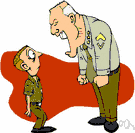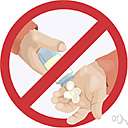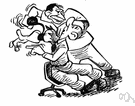abuse
(redirected from laxative abuse)Also found in: Thesaurus, Medical, Legal.
abuse
mishandle; misapply; pervert; revile, malign; mistreat: The greater the power, the more dangerous the abuse.
Not to be confused with:
disabuse – to free a person from deception, error, or misconception: I want to disabuse you of your opinion of the gentleman.
Abused, Confused, & Misused Words by Mary Embree Copyright © 2007, 2013 by Mary Embree
a·buse
(ə-byo͞oz′)tr.v. a·bused, a·bus·ing, a·bus·es
1. To use improperly or excessively; misuse: abuse alcohol; abuse a privilege.
2. To hurt or injure by maltreatment; ill-use: animals that were abused by a negligent owner.
3. To force sexual activity on; rape or molest.
4. To assail with insulting or hurtful words; revile.
5. Obsolete To deceive or trick.
n. (ə-byo͞os′)
Idiom: 1.
a. Improper or excessive use; misuse: abuse of authority; drug abuse.
b. Rough treatment or use: shoes that have taken a lot of abuse.
2.
a. Physical maltreatment or violence: spousal abuse.
b. Sexual abuse.
c. Insulting or hurtful language, especially when used to threaten or demoralize: subjected her subordinates to verbal abuse.
3. An unjust or wrongful practice: a government that commits abuses against its citizens.
abuse oneself
To masturbate.
[Middle English abusen, from Old French abuser, from abus, improper use, from Latin abūsus, past participle of abūtī, to misuse : ab-, away; see ab-1 + ūtī, to use.]
a·bus′er n.
Synonyms: abuse, misuse, mistreat, ill-treat, maltreat
These verbs mean to treat wrongfully or harmfully. Abuse applies to injurious or improper treatment: "We abuse land because we regard it as a commodity belonging to us" (Aldo Leopold).
Misuse stresses incorrect or unknowledgeable handling: "How often misused words generate misleading thoughts" (Herbert Spencer).
Mistreat, ill-treat, and maltreat all share the sense of inflicting injury, often intentionally: "I had seen many more patients die from being mistreated for consumption than from consumption itself" (Earl of Lytton)."Experienced people ... become suspicious of those who by their own account are invariably ill-treated by the world" (Bertrand Russell)."[The professor was charged with] underpaying, neglecting, or otherwise maltreating his assistants" (David Rains Wallace).
These verbs mean to treat wrongfully or harmfully. Abuse applies to injurious or improper treatment: "We abuse land because we regard it as a commodity belonging to us" (Aldo Leopold).
Misuse stresses incorrect or unknowledgeable handling: "How often misused words generate misleading thoughts" (Herbert Spencer).
Mistreat, ill-treat, and maltreat all share the sense of inflicting injury, often intentionally: "I had seen many more patients die from being mistreated for consumption than from consumption itself" (Earl of Lytton)."Experienced people ... become suspicious of those who by their own account are invariably ill-treated by the world" (Bertrand Russell)."[The professor was charged with] underpaying, neglecting, or otherwise maltreating his assistants" (David Rains Wallace).
American Heritage® Dictionary of the English Language, Fifth Edition. Copyright © 2016 by Houghton Mifflin Harcourt Publishing Company. Published by Houghton Mifflin Harcourt Publishing Company. All rights reserved.
abuse
vb (tr)
1. to use incorrectly or improperly; misuse
2. to maltreat, esp physically or sexually
3. to speak insultingly or cruelly to; revile
4. (reflexive) to masturbate
n
5. improper, incorrect, or excessive use; misuse
6. (Sociology) maltreatment of a person; injury
7. insulting, contemptuous, or coarse speech
8. an evil, unjust, or corrupt practice
9. (Social Welfare) See child abuse
10. archaic a deception
[c14 (vb): via Old French from Latin abūsus, past participle of abūtī to misuse, from ab-1 + ūtī to use]
aˈbuser n
Collins English Dictionary – Complete and Unabridged, 12th Edition 2014 © HarperCollins Publishers 1991, 1994, 1998, 2000, 2003, 2006, 2007, 2009, 2011, 2014
a•buse
(v. əˈbyuz; n. əˈbyus)v. a•bused, a•bus•ing,
n. v.t.
1. to use wrongly or improperly; misuse: to abuse one's authority.
2. to treat in a harmful or injurious way: to abuse a horse; to abuse one's eyesight.
3. to speak insultingly or harshly to or about; revile.
4. to commit sexual assault upon.
5. Obs. to deceive or mislead.
n. 6. wrong, improper, or excessive use; misuse: the abuse of privileges; drug abuse.
7. harshly or coarsely insulting language.
8. bad or improper treatment; maltreatment.
9. a corrupt or improper practice or custom.
10. rape or sexual assault.
11. Obs. deception.
Idioms: abuse oneself, to masturbate.
[1400–50; late Middle English < Middle French abuser, v. derivative of abus < Latin abūsus misuse, wasting =abūt(ī) to use up, misuse (ab- ab- + ūtī to use) + -tus suffix of v. action]
a•bus′a•ble (-zə bəl) adj.
a•bus′er, n.
syn: abuse, censure, invective all mean strongly expressed disapproval. abuse implies an outburst of harsh and scathing words, often against one who is defenseless: abuse directed against an opponent. censure implies blame, adverse criticism, or condemnation: severe censure of her bad judgment. invective applies to strong but formal denunciation in speech or print, often in the public interest: invective against graft.
Random House Kernerman Webster's College Dictionary, © 2010 K Dictionaries Ltd. Copyright 2005, 1997, 1991 by Random House, Inc. All rights reserved.
abuse
Past participle: abused
Gerund: abusing
| Imperative |
|---|
| abuse |
| abuse |
Collins English Verb Tables © HarperCollins Publishers 2011
ThesaurusAntonymsRelated WordsSynonymsLegend:
Switch to new thesaurus
| Noun | 1. |  abuse - cruel or inhumane treatment; "the child showed signs of physical abuse" abuse - cruel or inhumane treatment; "the child showed signs of physical abuse"mistreatment - the practice of treating (someone or something) badly; "he should be punished for his mistreatment of his mother" child abuse - the physical or emotional or sexual mistreatment of children child neglect - failure of caretakers to provide adequate emotional and physical care for a child persecution - the act of persecuting (especially on the basis of race or religion) cruelty, inhuman treatment - a cruel act; a deliberate infliction of pain and suffering |
| 2. |  abuse - a rude expression intended to offend or hurt; "when a student made a stupid mistake he spared them no abuse"; "they yelled insults at the visiting team" abuse - a rude expression intended to offend or hurt; "when a student made a stupid mistake he spared them no abuse"; "they yelled insults at the visiting team"discourtesy, disrespect - an expression of lack of respect low blow - unscrupulous abuse billingsgate, scurrility - foul-mouthed or obscene abuse invective, vituperation, vitriol - abusive or venomous language used to express blame or censure or bitter deep-seated ill will | |
| 3. |  abuse - improper or excessive use; "alcohol abuse"; "the abuse of public funds" abuse - improper or excessive use; "alcohol abuse"; "the abuse of public funds"usage, use, utilisation, utilization, exercise, employment - the act of using; "he warned against the use of narcotic drugs"; "skilled in the utilization of computers" | |
| Verb | 1. |  abuse - treat badly; "This boss abuses his workers"; "She is always stepping on others to get ahead" abuse - treat badly; "This boss abuses his workers"; "She is always stepping on others to get ahead"do by, treat, handle - interact in a certain way; "Do right by her"; "Treat him with caution, please"; "Handle the press reporters gently" kick around - treat badly; abuse; "They won't have me to kick around any more!" |
| 2. |  abuse - change the inherent purpose or function of something; "Don't abuse the system"; "The director of the factory misused the funds intended for the health care of his workers" abuse - change the inherent purpose or function of something; "Don't abuse the system"; "The director of the factory misused the funds intended for the health care of his workers"fracture - violate or abuse; "This writer really fractures the language" take in vain - use a name, such as God, without proper respect | |
| 3. |  abuse - use foul or abusive language towards; "The actress abused the policeman who gave her a parking ticket"; "The angry mother shouted at the teacher" abuse - use foul or abusive language towards; "The actress abused the policeman who gave her a parking ticket"; "The angry mother shouted at the teacher"slang - abuse with coarse language revile, vilify, vituperate, rail - spread negative information about; "The Nazi propaganda vilified the Jews" lash out, attack, snipe, assail, assault, round - attack in speech or writing; "The editors of the left-leaning paper attacked the new House Speaker" curse - heap obscenities upon; "The taxi driver who felt he didn't get a high enough tip cursed the passenger" | |
| 4. | abuse - use wrongly or improperly or excessively; "Her husband often abuses alcohol"; "while she was pregnant, she abused drugs" |
Based on WordNet 3.0, Farlex clipart collection. © 2003-2012 Princeton University, Farlex Inc.
abuse
noun
1. maltreatment, wrong, damage, injury, hurt, harm, spoiling, bullying, exploitation, oppression, imposition, mistreatment, manhandling, ill-treatment, rough handling an investigation into alleged child abuse
2. insults, blame, slights, curses, put-downs, libel, censure, reproach, scolding, defamation, indignities, offence, tirade, derision, slander, rudeness, vilification, invective, swear words, opprobrium, insolence, upbraiding, aspersions, character assassination, disparagement, vituperation, castigation, contumely, revilement, traducement, calumniation I was left shouting abuse as the car sped off.
3. misuse, corruption, perversion, misapplication, misemployment, misusage an abuse of power
verb
1. ill-treat, wrong, damage, hurt, injure, harm, mar, oppress, maul, molest, impose upon, manhandle, rough up, brutalize, shit on (taboo slang), maltreat, handle roughly, knock about or around She had been abused by her father.
ill-treat protect, care for
ill-treat protect, care for
2. insult, injure, offend, curse, put down, smear, libel, slate (informal, chiefly Brit.), slag (off) (slang), malign, scold, swear at, disparage, castigate, revile, vilify, slander, diss (slang, chiefly U.S.), defame, upbraid, slight, flame (informal), inveigh against, call names, traduce, calumniate, vituperate He alleged that he was verbally abused by other soldiers.
insult respect, praise, acclaim, flatter, compliment, commend, extol, big up (slang, chiefly Caribbean)
insult respect, praise, acclaim, flatter, compliment, commend, extol, big up (slang, chiefly Caribbean)
3. exploit, take advantage of, manipulate, misuse He showed how the rich and powerful can abuse their position.
Collins Thesaurus of the English Language – Complete and Unabridged 2nd Edition. 2002 © HarperCollins Publishers 1995, 2002
abuse
verb1. To use wrongly and improperly:
4. To attack with harsh, often insulting language:
1. Wrong, often corrupt use:
2. Physically harmful treatment:
3. Harsh, often insulting language:
The American Heritage® Roget's Thesaurus. Copyright © 2013, 2014 by Houghton Mifflin Harcourt Publishing Company. Published by Houghton Mifflin Harcourt Publishing Company. All rights reserved.
Translations
إسَاءَة إسْتِعْمَالسُوْءُ الاِسْتِعْمالشَتِيمَه، شَتْميُؤْذِييُسِيء إسْتِعْمَال
zneužítzneužitízneužívánínadávatnadávka
misbrugmisbrugemishandlemishandlingskælde ud
pahoinpitelysolvatasolvausväärinkäyttääväärinkäyttö
दुरूपयोग
zlostavljanjezlostavljati
gorombáskodáshelytelen használatvisszaél
ill meîferîmisnotamóîgunsvívirîa
濫用する虐待虐待する酷使するののしる
남용학대하다
abutor
grubiai elgtisnetinkamas elgesyspiktnaudžiautiužgauliaiužgauliojimas
apvainojumsapvainotlamasļaunprātīgi izmantotnepareiza lietošana, ekspluatēšana
poškodzovanie
žalitižaljivkazlorabazlorabitizmerjati
missbrukmissbrukamisshandelmisshandla
การข่มเหงข่มเหง
lạm dụngsự lạm dụng
abuse
A. [əˈbjuːs] N
1. (= insults) → insultos mpl, improperios mpl (more frm)
to heap abuse on sb; hurl abuse at sb → llenar a algn de improperios
to heap abuse on sb; hurl abuse at sb → llenar a algn de improperios
Collins Spanish Dictionary - Complete and Unabridged 8th Edition 2005 © William Collins Sons & Co. Ltd. 1971, 1988 © HarperCollins Publishers 1992, 1993, 1996, 1997, 2000, 2003, 2005
abuse
[əˈbjuːs] n
(= mistreatment) (physical) → mauvais traitements mpl child abuse, sexual abuse
[drugs, alcohol] → abus m
[əˈbjuːz] vt
(= mistreat) (physically) [+ child, patient] → maltraiter
abused children → les enfants maltraités
to be abused → être maltraité(e)
abused children → les enfants maltraités
to be abused → être maltraité(e)
(verbally) → insulter
(= misuse) [+ power, position] → abuser de
Collins English/French Electronic Resource. © HarperCollins Publishers 2005
abuse
n
no pl (= insults) → Beschimpfungen pl; a term of abuse → ein Schimpfwort nt; to shout abuse at somebody → jdm Beschimpfungen an den Kopf werfen; to heap abuse on somebody → jdn mit Beschimpfungen überschütten ? shower, stream
(= misuse) → Missbrauch m; (= unjust practice) → Missstand m; abuse of confidence/authority → Vertrauens-/Amtsmissbrauch m; abuse of power → Machtmissbrauch m; the system is open to abuse → das System lässt sich leicht missbrauchen
vt
(= revile) → beschimpfen, schmähen (geh)
Collins German Dictionary – Complete and Unabridged 7th Edition 2005. © William Collins Sons & Co. Ltd. 1980 © HarperCollins Publishers 1991, 1997, 1999, 2004, 2005, 2007
abuse
[n əˈbjuːs; vb əˈbjuːz]1. n
b. (cruel treatment, of children) → abuso; (of patients, prisoners) → maltrattamento
c. (misuse, of drugs, solvents) → abuso
abuse of power → abuso di potere
open to abuse → che si presta ad abusi
abuse of power → abuso di potere
open to abuse → che si presta ad abusi
2. vt
b. (revile) → insultare
c. (maltreat, children) → approfittare sessualmente di; (patients, prisoners) → maltrattare
Collins Italian Dictionary 1st Edition © HarperCollins Publishers 1995
abuse
(əˈbjuːz) verb1. to use wrongly, usually with harmful results. She abused her privileges by taking too long a holiday.
2. to insult or speak roughly to. She abused the servants.
(əˈbjuːs) noun1. insulting language. He shouted abuse at her.
2. the wrong use of something. This toy has been subjected to a lot of abuse.
aˈbusive (-siv) adjective using insulting language. He wrote an abusive letter to the manager.
aˈbusively adverbaˈbusiveness noun
Kernerman English Multilingual Dictionary © 2006-2013 K Dictionaries Ltd.
abuse
→ سُوْءُ الاِسْتِعْمال, يُؤْذِي zneužít, zneužívání misbrug, misbruge Missbrauch, missbrauchen κακοποίηση, κακοποιώ abusar, abuso käyttää väärin, pahoinpitely maltraiter, mauvais traitement zlostavljanje, zlostavljati abusare, abuso 濫用する, 虐待 남용, 학대하다 misbruik, misbruiken misbruk, misbruke wykorzystać, wykorzystywanie abusar, abuso оскорбление, оскорблять missbruk, missbruka การข่มเหง, ข่มเหง kötüye kullanmak, taciz lạm dụng, sự lạm dụng 侵犯Multilingual Translator © HarperCollins Publishers 2009
a·buse
n. abuso, uso exagerado; maltrato;
___ of medication → uso exagerado de medicamentos o drogas;
spouse ___ → ___ conyugal;
verbal ___ → maltrato de palabra, insulto;
vt. [to take advantage of] abusar de; maltratar; seducir.
English-Spanish Medical Dictionary © Farlex 2012
abuse
n abuso, maltrato; child — maltrato or abuso infantil, maltrato a (los) niños, abuso de (los) niños; drug — abuso de drogas; drug of — droga de abuso; elder — maltrato a (las) personas mayores, maltrato a (los) adultos mayores (Amer); physical — maltrato or abuso físico; psychological — maltrato or abuso psicológico; sexual — maltrato or abuso sexual; substance — abuso de sustancias, abuso de drogas o alcohol; vt abusar, maltratar; to — drugs abusar de drogasEnglish-Spanish/Spanish-English Medical Dictionary Copyright © 2006 by The McGraw-Hill Companies, Inc. All rights reserved.